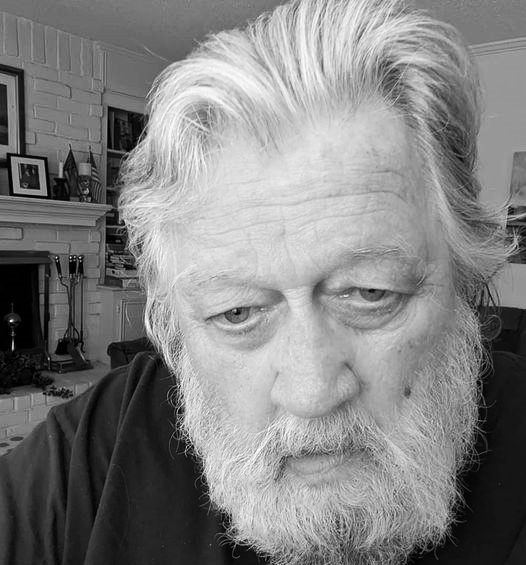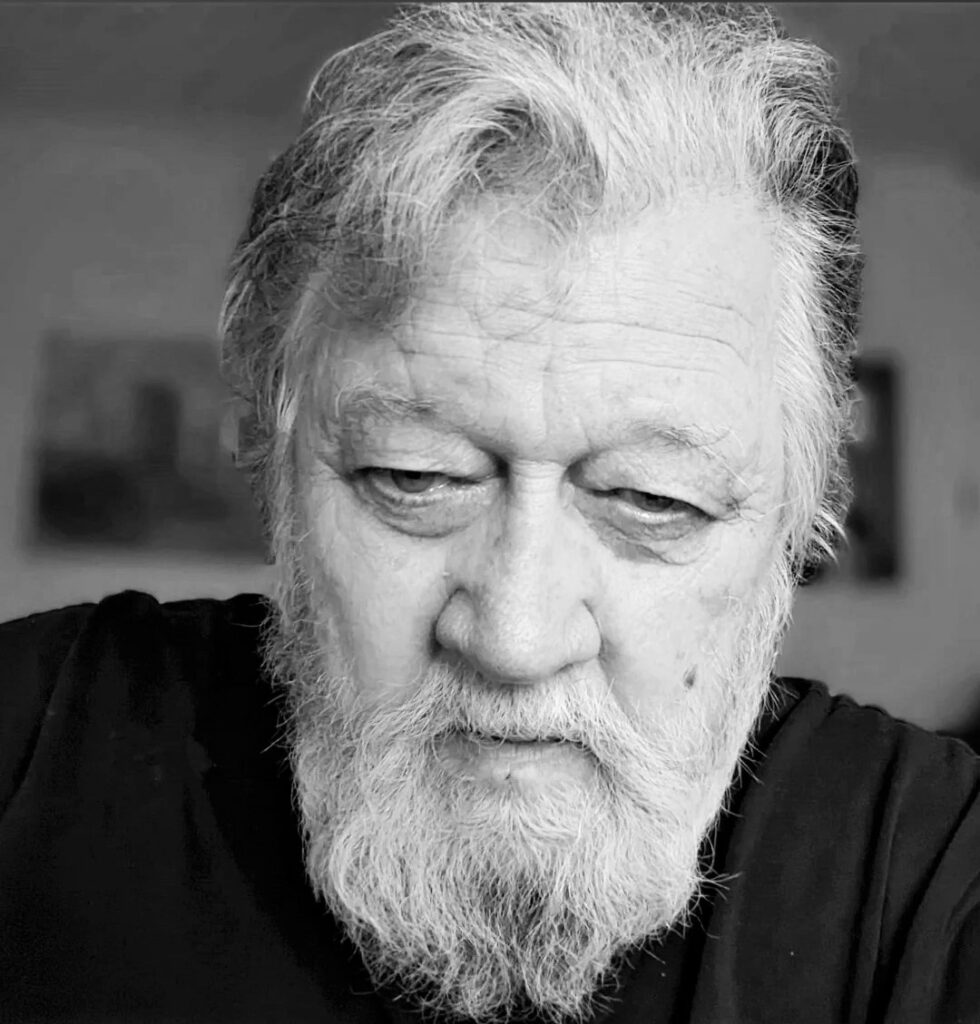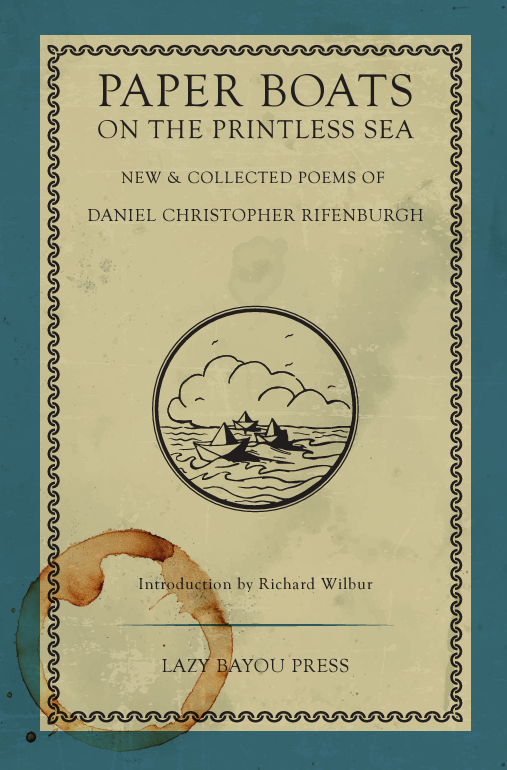vvvvvvvfvffffffffffffff
Daniel Christopher Rifenburgh
Explore Daniel Christopher Rifenburgh’s poetry through a portfolio showcasing ten of his poems. Also on the website are an introduction to his work by poet Richard Wilbur, a sampler of comments on his work from fellow poets, and a brief biography.
NAVIGATION: The entire website is on this one page, meaning you will scroll up or down to locate a section or an item.

Poetry has always been said to speak a charged, heightened language, and that is still part of its job description, even if some of our contemporary verse is pretty prosaic in character. Daniel Rifenburgh’s words, which I first came across five years ago, seem to me to bear a considerable charge, and perhaps I can give some reasons why.
Though he can admirably sustain a sardonic mood (“El Vendador”), a comic one (“Donald Justice Before A Soft Drink Vending Machine”), or any other, he is most remarkable in such a poem as “Turf Tract,” whose truant speaker has temporarily neglected poetry for the easier excitement of betting on the horses. The poem moves fluently, and with great accuracy of tone, through a sequence of moods (including defensive mockery, irony, slangy idealism, disgust, rueful mimicry), and ends with a poignant lyric vision in which the “fleet hooves” of horses embody the beauty, striving and brevity of life.
Such poetry is rich because of its many articulate selves, and the way its variety of voices makes for a striking texture of dictions: in Rifenburgh’s “Lycidas,” for instance, such a lofty line as, “And I will find again the diurnal track” is just three lines away from “Willie Boy, you beat / Me back to the barn,” and both of those tones are appropriate and authentic.
Rifenburgh’s poems have their linear norms, their stanza-like divisions, their reminiscences of basicmeters, but what governs the movement of his poems is a genius for the speaking voice – its keys, rhythms, and modulations, its dialects and echoes. So strong and sufficient is that ability, that his poems often deal audaciously with the elements of traditional form and get away with it. Sometimes there will be an expressive local flurry of rhyme and assonance, seeming perhaps like a brief jig or – as at the close of “LSD & All,” – a muted dirge.
When this poet makes use of the villanelle, as in the delightful “Written Words, Like Paintings,” he takes the form over rather than strictly complying with it. The language of Advent often has the force of spare accuracy: it can also stun the reader with a brilliant, slowfuse image. Both kinds of powerful language are in this snippet from “The Old at Hillsboro Inlet,” a poem in which elderly tourists are perching on a Florida breakwater and gazing at the sea.
They seem to sit and peruse
Seamarks, spume
And the beating of wings
In the open vestibule, exhuming
A lacquered sensitivity, wanting
To groom themselves to the air,
To the sea,
Desiring, perhaps, a practice flight
For the leave-taking from the flesh,
The shedding of tugged sleeves.
That splendid last line has a multiple effect. Quite apart from its meaning, it is a unique, surprising assembly of words; it serves as a figurative variation on the preceding line; its sleeves are part of the literal, windy scene; and “tugged” makes us think of how we are plucked at by all the importunities of the body and the world.
The close of that poem is particularly moving, as the reader will find, and for all his complexity Rifenburgh is a poet of strong, forthright feelings, dark or light. His feeling for poetry itself has a daring and unfashionable exaltation, and he can say, after experiencing Montale’s The Storm,
. . . it seems, in the afterglow of such reading,
As if light had an enduring stepchild in the world
Wandering between the Word
and its infinite extension
More than a few of Daniel Rifenburgh’s lines can make you feel that way.
Richard Wilbur
Covington, Massachusetts
September 2001

“The poems are terrific: so fluent, so smart, and brimming with charm. Rifenburgh is my candidate for discovery of the year. He cannot be compared to X or Y. He is Z all by himself.” – Donald Justice
“Of very few books, let alone first books, does one wish to proclaim, “This is it!” Advent is that rare exception, a collection certain to please all who care for the art. Daniel Rifenburgh has all one could possibly hope for in a new poet: ambition, wisdom and breathtaking skill.” Lucien Stryk
“Before I set down the first word of any commentary about Paper Boats, I am well aware, painfully, of the inadequacy. Whatever I say won’t sound enthusiastic enough. This is one of the most remarkable volumes of poetry I have ever read.” Fred Chappell
These poems are startling in their vividness, skill, their originality and solidity. I find that lines and images resonate long after they have served the purposes of their local contexts. Mr. Rifenburgh’s work deserves wider notice, particularly when so much of scant merit is greeted with acclaim.” Anthony Hecht
“The language often has the force of spare accuracy: it can also stun the reader with a brilliant, slowfuse image. What governs the movement of the poems is a genius for the speaking voice — its keys, rhythms, and modulations, its dialects and echoes. Such poetry is rich because of its many articulate selves, and the way its variety of voices makes for a striking texture of dictions.” Richard Wilbur
“Rifenburgh is enjoyable because he ranges at large over many subjects, testing, exploring, reporting, celebrating; he has many moods . . . yet, for all his ironic witticisms, Rifenburgh is, au fond, a profoundly spiritual poet.” Anne Stevenson London Magazine (UK)
“Rifenburgh is a varied poet . . . he has his literary side but some of his best work is from personal experience: poems on the death of his brother; on his uncle with a birth defect; on a broken marriage; on substance abuse in the 60s; even on selling used cars. When he writes in forms, he handles them superbly. Robert Phillips Houston Chronicle
“Rifenburgh writes vividly and forcefully on a wide range of subjects. Andean Music is a fascinating sequence of eight poems, colourful and intelligent. Lycidas is a moving elegy on the poet’s brother; Donald Justice before a Soft-Drink Vending Machine is gently humorous. Rifenburgh’s range is considerable, his technical control impressively assured, without ever being pedantic.” Glyn Pursglove Acumen (UK)

PORTFOLIO
OF POEMS
BY DANIEL CHRISTOPHER RIFENBURGH
MY WIFE AT DAYBREAK SINGING IN SPANISH
A PSALM OF ASCENTS
She will lift up
Her eyes, she sings,
To the mountains, to Jehovah,
Where comes her succor,
Donde vendra mi socorro,
Though there are no mountains
In coastal east Texas
And the battle god
Of that wandering tribe
Has not been noticed stopping
Here of late;
Yet she,
A source, a strength
Asks of “Ae-o-VA”
This succor
And lifts up her eyes,
As if to mountains,
Spreading her arms
Wide to receive
As she sings
And receives
And the faltering
Day comes on, as
If beckoned by one.
THE OLD AT HILLSBORO INLET
He’ll shape his old course, in a Country new.”
- Shakespeare, King Lear
The long breakwater
Of square-cut boulders strewn
Out from Hillsboro Inlet appears,
This afternoon hour,
Like a strange rookery,
So many old people are on it
So many snowbirds lately arrived,
The elder tourists from the north
Our strip of Florida receives
In the winter months, arrayed
On their purchase of rock,
All facing and gazing long at the sea.
“God’s waiting room,” my mother
Laughingly calls this part
Of the Florida coast, even
Though she’s sixty-five. And so
They seem to sit and peruse
Seamarks, spume
And the beating of wings
In the open vestibule, exhuming
A lacquered sensitivity, wanting
To groom themselves to the air,
To the sea,
Desiring, perhaps, a practice flight
For the leave-taking from the flesh,
The shedding of tugged sleeves.
How they regard
The mangroves, desperately rooted
To the inner shore of the inlet,
Holding the land
In clutch,
Refusing to give up
To the fluted and edged tools
Of the tide, keeping stand
Over clumps and grains
Of the literal ground
Of their being;
(They regard them as homely,
Brave children).
A squadron of pelicans,
Prehistoric remnants, flies over
In perfect “V” formation, remindful
To the old, of bombers skirting past Dover,
Channel-topping, headed at the Ruhr.
In mirroring unison
The arms of the old rise in gesture,
Fingers pointing, arms
Like plucked wings of birds,
Tremulous, bare, slender,
And the wind comes at them,
Strong now, lifting,
The memorial land
Behind them becoming a blur.
THESE WRITTEN WORDS, LIKE PAINTINGS
Seem to talk to you as though they were bright, clever
But if you ask them anything about what they are saying
They go on telling you just the same thing forever.
So Plato has Socrates, in the Phaedrus, declare
And his complaint, his words, so incisive, disarming,
Seem also to talk to you as though they were bright, clever
But neither do they avail of probing or questioning. Rather,
Frozen on the pages these ages unending,
They go on dumbly recounting the same thing over:
That they are counters for wit, counterfeit intelligencers,
Clear or crimson jewels that, their facets shimmering,
Seem to wink at you as though they were smart; however,
Just once press them, why the strict typographer
Won’t let them relax, respond, refine their meaning,
And they go on blithely recounting the same thing forever.
Just so, dear reader, are these lines, scribbled by a writer
Who’s soon absconded, even as they go on telling,
Like a busted watch or scene from Goya,
A fixed, unrelenting thing forever.
For Mary McCleary
SESTINA: MY FATHER’S WILL
When he knew he was about to die, my father
Gathered his three sons and his brother
Around our oval, oaken table.
He handed his written will to me. Read it,
He indicated, and I began reading the thing
Aloud, groping with the first sentences.
He would have read the will himself, but the thing
That was killing him was throat cancer: it
Had seized that voice my brothers
Remembered as both bell and thunder. Charged sentences
He spoke in wrath could split a table.
We’d heard his voice as Zeus, Jehovah, God the Father.
I didn’t want to read the thing
But, obedient, started in on it.
After five or six sentences
He cut me off, slamming the table.
I looked up and my father
Indicated angrily that it be passed to my eldest brother.
I supposed I had done a bad job of it
And pushed the papers across to my brother.
He got only about three sentences
Into the document when my father
Pounded his fist on the oaken table
Again, shaking the thing.
Regathering his composure, my father
Directed the will be given to his brother
And once more across the table
Went the troublesome thing.
My uncle spoke firmly from the first sentence
And was allowed to read uninterrupted to the end of it.
Now, what was in it,
I don’t think I remember a sentence
Of the damn thing,
Nor do my brothers.
I only recall the pounding of the table
And the rage whelming within my father.
Sitting at the same table, recalling that day, my brothers
And I speak of it in falsely casual sentences.
My father’s will is still a terrible thing.
VOICE
Today I am proud of all poets everywhere,
For it’s true: the voice is sacred;
Such is this mix of meaning, muscle and air.
Though they toil in private, as at solitaire,
And often wilt among the living and thrive among
the dead,
Today I am proud of all poets everywhere
For they loose the stops, and what issues there
Is like a dance upon an isthmus between two sea-beds;
Such is this mix of meaning, muscle and air,
And they are its outlets, the vivid portals in air
Through which the winds of fresh revelations are sped,
So that today I am proud of all poets everywhere.
Some god, in his hunger to be known, pared
His desire into a pipe of flesh, and through it like a living thread
Goes this mix of meaning, muscle and air.
O Voice, rising in rage, or lifted in prayer,
Or falling silent, in despair of all that cannot be said,
Today I am proud of all poets everywhere,
Such is this mix of meaning, muscle and air.
for Richard Wilbur
THE CATASTROPHE
Dog to coyote to wolf,
The cry went forth,
Able to Baker to you.
Henri Coulette
It was dormant awhile, latent
In several pockets, fingered lightly,
Then it was at throats, brandished in the air,
Then slicing through clouds over water,
A drawer of knives falling out of the sun.
Now it is a bloom of fiery tulips,
A shattering of crystal,
And now a fountain of dust,
A hooded viper rising in the air.
It flies off transmitters,
Flickers on tv screens, retinas
And unrolls itself from cylindrical presses.
It is quartered, chopped, bundled
And dumped from the platforms
Of slowly rolling trucks.
And it grows. It sits down
To lunch with multitudes, passing the salt.
It tangles itself with music, filters down
With the sawings of ardent violins.
The yellow light of the radio dial is sweating with it.
The conductor furiously mops his brow.
And now it is a wraith of a crack whore,
Spindly and woven of silt and soot,
Advancing gamely on stiletto heels,
Stepping to a jagged tango and thrusting forth
The hollow of her open hand.
My feet are gliding towards her.
My heavy arms lighten
And rise to open.
She is whispering in my ear now,
Taking firmly my hand.
Look, we are dancing.
after Justice
TOLSTOY: WITH NAPOLEON IN FLIGHT FROM
MOSCOW, GENERAL KUTUZOV SPEAKS TO HIS
TROOPS NEAR DOBROE, 1812
“Here’s the thing, brothers.
I know it’s hard for you, But what’s to be done?
Be patient, it won’t last long.
We’ll see our guests off,
Then we’ll have a rest,
The tsar will not forget your service.
“It’s hard for you,
But still, you’re at home;
But they—see what they’ve come to.
Worse than the lowest beggars.
“While they were strong
We took no pity on ourselves But now we can pity them.
They’re also people. Right, lads?”
The men in the ranks looked at him
Sympathetically, with intent,
Respectfully puzzled eyes.
The old general paused. He felt
Their eyes on him, their puzzlement.
This was no way to leave them,
Not after all this. Slowly a smile, starlike,
Wrinkled the corners of his mouth.
He hung his head then, as if in perplexity,
Shrugged his shoulders and spoke again.
“But, that said,
Who invited them here?
It’s their own doing.
Fuck them in the ass!”
The men started laughing then,
Breaking ranks, guffawing,
And roared, “Hurrah!” and again, "Hurrah!"
As the old general, for the first time
In the whole campaign, stood in his stirrups,
swung his whip, and rode off at a gallop.
TURF TRACT
In Shelley’s last, unfinished poem,
In Shelley’s great poem which is without closure
Because the poor poet drowned in water,
In Shelley’s great “The Triumph of Life,”
The last word of which is “of “
And the whole thing stops right there
While Shelley goes out to take in a boat ride
(Talk about your Lethe and Nepenthe!),
We meet, according to Harold Bloom
And Lionel Trilling, “Rousseau,
Prophet of nature, serving
As a surrogate for Wordsworth, entering
The poem as Vergil, the guide to Shelley’s Dante,”
And all of this is related to you by Rifenburgh.
It’s much easier, and sometimes as rewarding,
To study the bloodlines of flat-track thoroughbreds,
Such as: Raise A Bid got out of Botcha,
Botcha’s Bid, or: This
Is Enough from On To Glory
Gave This Is Glory, especially if he won,
But Life always wins. It’s got
By Spirit out of Some Kinda Shit
And the odds are a zillion to one
(Or, is it one to a zillion, I forget)
That Life is going to win,
Going to suck you in, and Something Spritely
Is the racing name of that foal.
How can you resist her?
Who said you should?
Shelley did;
Laid his pen aside for an hour
And died, gasping water for air, air
And Life.
I sat in my car outside the track
And counted my losses.
Life lay down with death beside me
And they had the nerve
To fornicate in front of me.
I was thinking, not of “those few
At Athens or Jerusalem,”
But of how Mar Best gave
Mon Go Fast by Mongo
And mon do go fast
But the colt, he finish last
And my money was wasted
Fast as life, fast as that,
Fast as was the track
Where the fleet hooves
Tossed up the turf,
The little clods of this our earth,
The quick, high flinging and falling of
PABLO NERUDA COMES FLYING
For a celebration in Houston of Neruda’s Centennial
With a green, articulate wave carved at the zenith
of its potency, hungry for the pebbles of La Isla Negra,
With an inner guitar strumming a ballad
of absence and seashells,
With chains and carnations and tangled lianas of the south
You come flying.
With the snouts of alligators pushing through storm-
drenched reeds,
With the aloof guanaco marching his solitary heights,
With the blazing puma and the undulant jaguar,
With the placid llama of scrupulous eye
And the secret, coiled, priestly anaconda
You come flying.
With the granite hitching post of the sun,
The Inti-Huatana of Machu Picchu,
With the corn men and serpents of Chichen-Itza,
With the delicate coca leaves of Mamapacha
And the plumes, brilliant, of Quetzalquatl
You come flying.
With Andalusian oranges and Madrileño street corners,
With Castillian mesas dry and taut as drumskins,
With exit visas from the Apocalypse and a ship
full of refugees,
With the angels of Rafael Alberti and tungsten tears of
Vallejo,
With Picasso’s almond eyes,
With the last gaze of Miguel Hernandez,
You come flying.
With the arks of blue waters, the Antarctic leviathans,
plunging to their hidden sanctuaries,
With the snail and the polyp and the sideways crab,
With the albatross and the anchovy,
the penguin and the pompano
Skipping over the Humboldt Current of the Pacific
You come flying.
With the fire of the salamander in your eyes,
With the clangorous boom of ocean in your thorax,
With a sprig of fresh laurel on your lips
And the dolorous keenings of mankind in your ears,
With strong white teeth to rip the masks off the world
You come flying,
Oceanic, solitary, questioning,
Praising and condemning, curious and cursing,
Breaking constellations of ice,
Scribbling leaflets of quartz and obras of iron,
You come flying,
Pablo Neruda
El Poeta Chileno
One hundred years
Cien años
And there is no end
To your flight
Still, Pablo,
You come flying,
Viene volando.
VILLANELLE FOR THE SPOKEN WORD
The motions of winds inhere in our words,
But, setting down their burdens of sense,
They wheel and fly from us like lofting birds,
Leaving, as spirit leaves flesh, the uninterred
Residue of a rushing turbulence.
Recall: the motions of winds stirred within our words
Like lovers who woke with us then, sulky, abjured
The offices of the day. Without pause or pretense,
They wheeled and flew from us like skittish birds,
And left, on tangled sheets, scores for unheard
Music, and ghosts of a fled eloquence.
Still, their traces, late or soon, well up within words
And living powers are with them conferred
If we but speak them aloud, by a correspondence.
So may we breathe and rise, lifting with our words
And a gift on the wing be procured
Of sounding speech in its utterance:
The riding of these motions of winds within words,
Even as we wheel them from us like lofting birds.
for Tommy Gay

BIOGRAPHY
Daniel Christopher Rifenburgh was born May 24, 1949 in Elmira, New York, the third son of William and Helen Rifenburgh. His family moved from Elmira to Louisville, KY, then to Port Chester, NY and finally settled in Pompano Beach, FL. In 1964 at age fifteen Rifenburgh stowed away on the Cunard liner RMS Queen Mary from New York to Southampton and made international news wires while enjoying, furtively, the freedom of London.
He matriculated at the University of Louisville in 1967 and in 1968 received a Creative Writing Scholarship upon the recommendation of his teacher, poet Robert Hayden. In 1971 Rifenburgh drew a low draft number in the new lottery and enlisted in the US Army. He graduated at the top of his class at the Defense Information School, was promoted ahead of time-in-grade, granted a Top Secret security clearance, and served as a military journalist, working out of the Office of Chief of Information, HQDA, at The Pentagon. His stories, articles and photos appeared in Soldiers Magazine, Army News Features, Stars and Stripes and the Army Newspaper Program. He also maintained informational laison with the House and Senate Armed Services Committees. He received an Honorable Discharge in 1975.
He gained a B.A. (English) from Florida Atlantic University in 1981 and then worked as a newspaper reporter (Jupiter Courier-Journal, FL) and magazine freelancer. He also traveled widely in Latin America, making extended stays in Mexico, Puerto Rico, Costa Rica and Peru, where he learned the rudiments of the Spanish language.
Rifenburgh received the M.A. in English/Creative Writing in 1987 from the University of Florida, married his Peruvian girl, Paola Baca, and pursued further graduate studies at the University of Houston Creative Writing Program. His son William was born in Houston in August, 1988.
Rifenburgh passed several years pursuing a desultory career as an adjunct college professor and, disappointed finally with academia, spent the last decade of his active working life as an 18-wheeler truck driver, where he had the opportunity to travel in all but a handful of the United States before settling into a local job, hauling steel and pipe out of the Port of Houston.
His first full-length book, Advent, was published in 2002 by The Waywiser Press of London. The publisher, Philip Hoy, invited Rifenburgh to perform a grand reading tour of England, along with American poet Timothy Murphy. He read at The Wordsworth Trust in the Lakes District, twice at Oxford University (Oxford University Poetry Society and W.H. Auden Society, Christ Church College) and at University College London and the Royal Festival Hall at South Bank Centre, London.
His second book Isthmus was published in 2012 by Mutabilis Press of Houston. Rifenburgh’s third collection, Paper Boats, was published by Lazy Bayou Press of Houston in 2021. A forthcoming book, Paper Boats On The Printless Sea: New & Collected Poems, will appear in January 2025.
He has received the Robert H. Winner Award from the Poetry Society of America, the Natalie Ornish Award from the Texas Institute of Letters (TIL) and several other awards, scholarships and fellowships, including the prestigious six-month Dobie-Paisano Fellowship from the University of Texas School of Graduate Studies and the TIL. He also received scholarships to the Sewanee Writers Conference and the West Chester Poetry Conference.
Rifenburgh was invited to participate as an editor and writer-instructor in the National Endowment for the Arts’ Operation Homecoming initiative by Dana Gioia, Chairman of the NEA. This initiative encouraged and curated writings by US service personnel, recent veterans and their families, and led to an anthology published by Random House and excerpted in the pages of the New Yorker. Later he led a similar veterans writing program at Houston’s Michael E. DeBakey Medical Center of the VA, in partnership with Houston Grand Opera’s outreach program.
His work has appeared in The New Republic, Paris Review, Shenandoah, Southwest Review, New Criterion, Western Humanities Review and other fine journals. He lives with his family in Houston, Texas and recently celebrated the birth of a first grandchild, Athena Hope.

Athena Hope Rifenburgh
Forthcoming in January, 2025:
